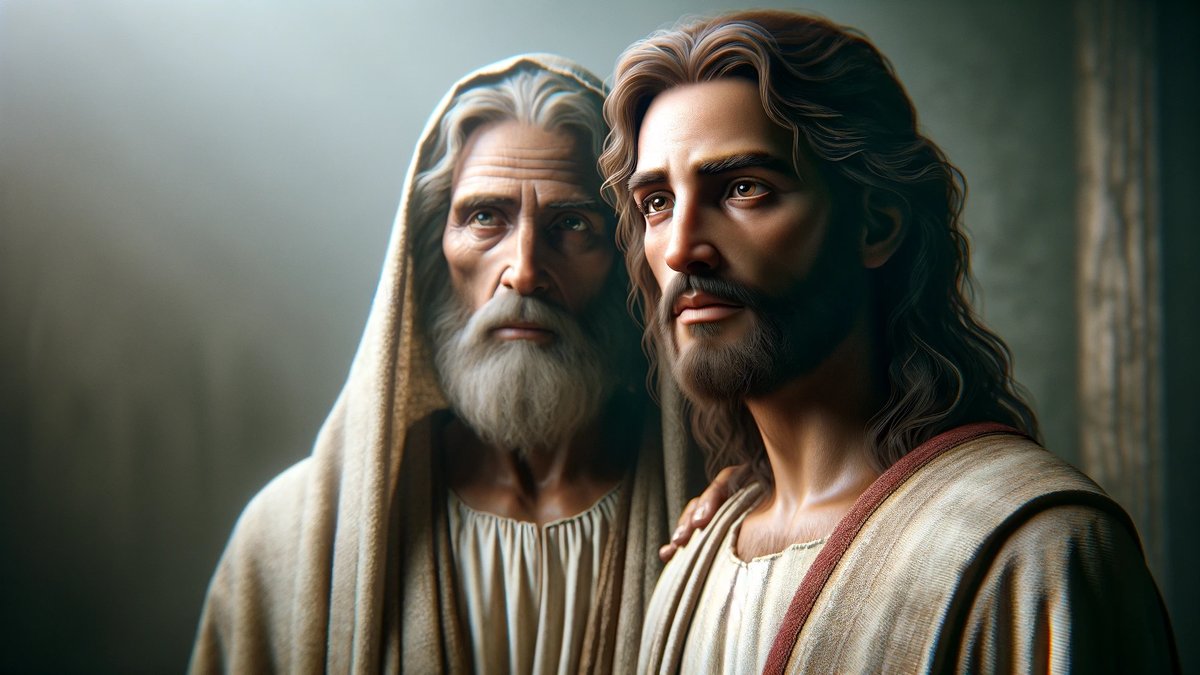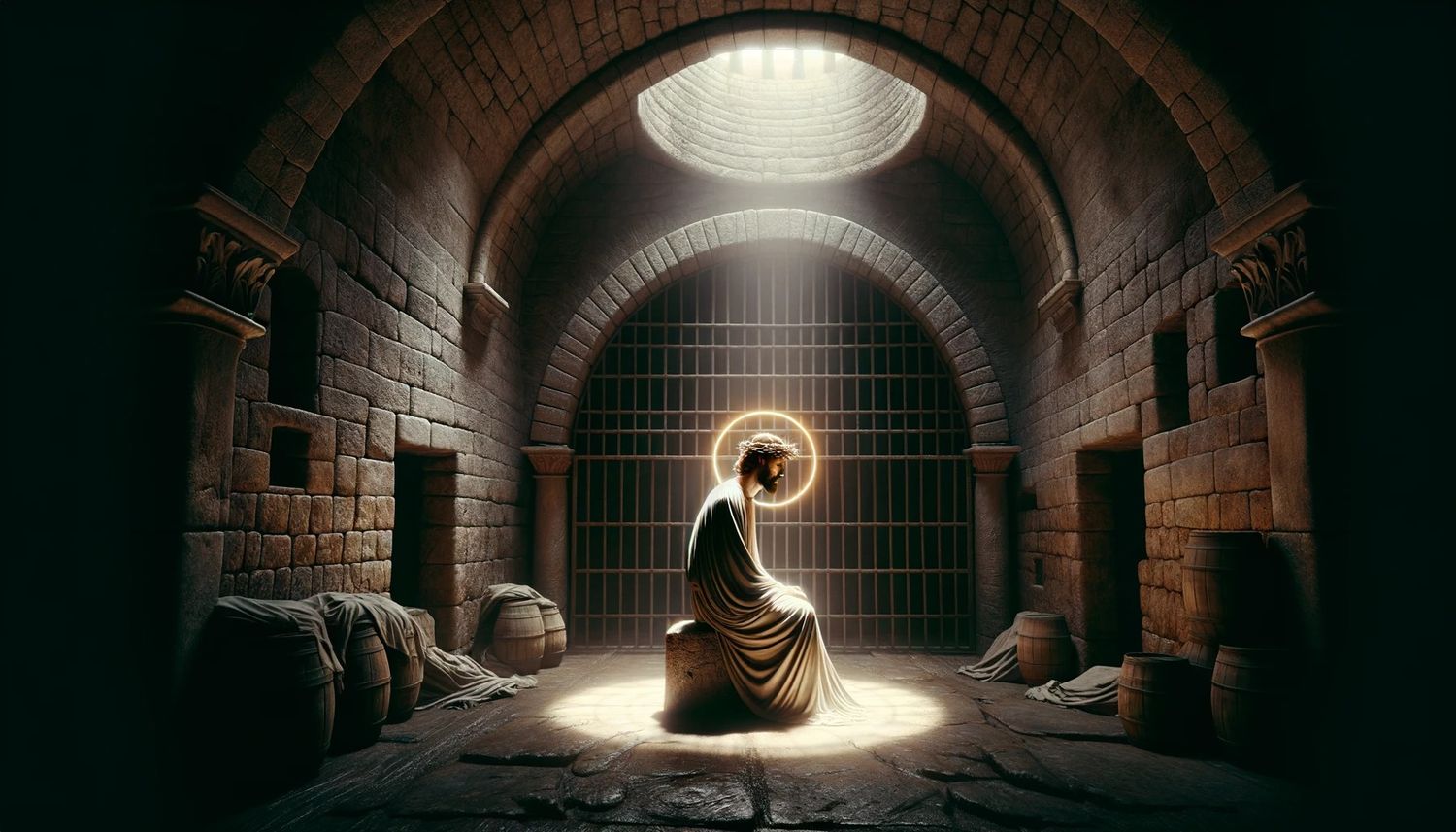Home>Theology and Spirituality>How Did John The Baptist Know Who Jesus Was


Theology and Spirituality
How Did John The Baptist Know Who Jesus Was
Published: February 20, 2024
Peter Smith, Editorial Director at Christian.net, combines deep insights into faith, politics, and culture to lead content creation that resonates widely. Awarded for his contributions to religious discourse, he previously headed a major organization for religious communicators, enhancing dialogue on faith's societal impacts.
Discover how John the Baptist recognized Jesus and explore the theological significance of their connection. Gain insights into theology and spirituality.
(Many of the links in this article redirect to a specific reviewed product. Your purchase of these products through affiliate links helps to generate commission for Christian.net, at no extra cost. Learn more)
Table of Contents
Introduction
The story of John the Baptist and his recognition of Jesus is a profound and captivating aspect of Christian theology. It delves into the intricate tapestry of spiritual connections and divine revelations. John the Baptist, a central figure in the New Testament, is known for his pivotal role in preparing the way for the coming of Jesus Christ. His profound understanding of Jesus' identity and purpose is a testament to the spiritual depth and insight that characterized his life.
The encounter between John the Baptist and Jesus is a pivotal moment in the biblical narrative, shedding light on the profound spiritual connection between the two figures. Understanding how John recognized Jesus and the significance of this recognition provides invaluable insights into the spiritual dynamics at play during this transformative period in history.
As we delve into the details of John the Baptist's life and his encounter with Jesus, we unravel a compelling narrative that transcends mere historical accounts. It offers a glimpse into the spiritual interconnectedness that underpins the Christian faith, inviting us to contemplate the profound mysteries of divine revelation and the unfolding of God's plan for humanity.
John the Baptist's Background
John the Baptist, also known as John the Forerunner, occupies a significant place in Christian history and theology. His background is shrouded in spiritual significance and divine purpose, setting the stage for his remarkable encounter with Jesus Christ.
John was born to elderly parents, Zechariah and Elizabeth, both of whom were descendants of Aaron, the first high priest of Israel. His miraculous conception was foretold by the angel Gabriel, signaling his extraordinary destiny from the very beginning. John's upbringing was marked by a deep sense of spiritual calling and separation, as he spent much of his early life in the wilderness, preparing for the divine mission that awaited him.
The prophetic mantle of Elijah rested upon John, as he emerged as a powerful voice in the Judean wilderness, calling people to repentance and spiritual renewal. His attire, consisting of camel's hair and a leather belt, symbolized his identification with the prophetic tradition of old, evoking the imagery of Elijah and signaling his role as a herald of momentous change.
John's ascetic lifestyle and uncompromising message drew crowds from Jerusalem, Judea, and beyond, as people flocked to the wilderness to hear his powerful proclamation. His baptism of repentance symbolized a profound spiritual cleansing, preparing the hearts of the people for the imminent arrival of the long-awaited Messiah.
The backdrop of John's ministry, characterized by fervent preaching and baptismal rituals, set the stage for the pivotal moment when he would encounter Jesus. His unwavering commitment to his divine calling and his profound understanding of the scriptures positioned him as a central figure in the unfolding drama of redemption.
As we delve into John the Baptist's background, we encounter a figure whose life was intricately woven into the fabric of divine providence. His lineage, upbringing, and prophetic ministry all converged to prepare the way for the transformative impact of Jesus Christ, underscoring the profound interconnectedness of their respective missions.
John's Encounter with Jesus
The climactic moment of John the Baptist's life unfolded when he encountered Jesus at the Jordan River. As Jesus approached to be baptized by John, a profound exchange took place, illuminating the spiritual depth of their connection.
John, recognizing the divine nature of Jesus, initially hesitated, feeling unworthy to baptize the one he knew to be the Messiah. However, Jesus reassured him, emphasizing the importance of fulfilling all righteousness. This pivotal interaction underscored the unique roles that John and Jesus were destined to fulfill in the grand narrative of redemption.
As John immersed Jesus in the waters of the Jordan, a transcendent event occurred. The heavens opened, and the Spirit of God descended like a dove, alighting upon Jesus. A voice from heaven resounded, declaring, "This is my beloved Son, in whom I am well pleased." This extraordinary manifestation affirmed Jesus' identity as the Son of God, marking the commencement of his public ministry.
The encounter between John and Jesus at the Jordan River encapsulated a profound spiritual transfer of authority and validation. It signified the transition from the preparatory ministry of John to the manifestation of the long-awaited Messiah. John, in humbly acknowledging Jesus' divine status, played a pivotal role in affirming and ushering in the next phase of God's redemptive plan.
This momentous encounter also revealed the intricate interplay between humility and divine purpose. John's initial reluctance to baptize Jesus reflected his profound reverence for the sacredness of the moment. His humility and recognition of Jesus' exalted nature exemplified the depth of spiritual insight that characterized his life and ministry.
The significance of this encounter reverberates throughout Christian theology, underscoring the seamless continuity between the prophetic era and the fulfillment of God's promises in Jesus Christ. It serves as a poignant reminder of the interconnectedness of divine destinies and the profound spiritual discernment that enabled John to recognize the Messiah, even before the full revelation of Jesus' ministry unfolded.
In this pivotal moment at the Jordan River, the convergence of John the Baptist and Jesus epitomized the seamless continuity of God's redemptive plan. It marked the transition from anticipation to fulfillment, from preparation to manifestation, and from the heralding of the Messiah to the revelation of the Son of God.
John's Proclamation of Jesus
John the Baptist's proclamation of Jesus reverberated with profound significance, encapsulating the essence of his divine mission and the transformative impact of the Messiah's arrival. Following the momentous encounter at the Jordan River, John fervently testified to the identity and purpose of Jesus, heralding him as the long-awaited fulfillment of ancient prophecies.
With unwavering conviction, John declared Jesus to be the Lamb of God who takes away the sins of the world. This proclamation resonated with deep theological implications, intertwining the sacrificial imagery of the Passover lamb with the redemptive mission of Jesus. By identifying Jesus as the Lamb of God, John illuminated the profound atonement and liberation that would be accomplished through Christ's ultimate sacrifice.
Furthermore, John emphasized the surpassing nature of Jesus, declaring, "He must increase, but I must decrease." This poignant declaration encapsulated the essence of John's humility and his recognition of Jesus' preeminence. It underscored the divine orchestration of their respective roles, with John joyfully yielding to the exalted status of the Messiah.
John's proclamation of Jesus extended beyond mere verbal affirmations, as his entire life and ministry bore witness to the transformative power of the coming Messiah. His unwavering commitment to preparing the way for Jesus, coupled with his fearless denunciation of religious hypocrisy, exemplified the profound impact of encountering the living Christ.
The culmination of John's proclamation found its resonance in the hearts of those who encountered his message. Multitudes flocked to hear him, drawn by the authenticity and fervor of his testimony regarding Jesus. His profound influence transcended societal boundaries, captivating the hearts of tax collectors, soldiers, and common people, all of whom were deeply impacted by his proclamation of the Messiah.
In essence, John the Baptist's proclamation of Jesus epitomized the convergence of prophetic anticipation and divine fulfillment. It served as a clarion call to embrace the transformative message of redemption embodied in Jesus Christ. Through his resolute testimony and unwavering commitment, John illuminated the profound significance of Jesus' arrival, igniting a spiritual awakening that reverberates through the annals of Christian history.
The enduring impact of John's proclamation underscores the timeless relevance of embracing Jesus as the focal point of faith and redemption. It invites individuals to heed the resounding testimony of John the Baptist and embrace the transformative power of Jesus, the Lamb of God and the embodiment of divine grace and truth.
Conclusion
The profound narrative of John the Baptist's recognition of Jesus encapsulates the intricate tapestry of divine providence and spiritual revelation. From the backdrop of John's ascetic upbringing to his pivotal encounter with Jesus at the Jordan River, the interconnectedness of their destinies unfolds with resounding significance.
John the Baptist's unwavering commitment to his prophetic calling and his profound understanding of the scriptures positioned him as a central figure in the unfolding drama of redemption. His proclamation of Jesus as the Lamb of God and the declaration of Jesus' preeminence underscored the depth of spiritual insight that characterized his life and ministry.
The climactic encounter at the Jordan River, marked by the descent of the Spirit and the heavenly declaration affirming Jesus' divine identity, serves as a poignant reminder of the seamless continuity between the prophetic era and the fulfillment of God's promises in Jesus Christ. It signifies the transition from anticipation to fulfillment, from preparation to manifestation, and from the heralding of the Messiah to the revelation of the Son of God.
John the Baptist's proclamation of Jesus reverberated with profound significance, encapsulating the essence of his divine mission and the transformative impact of the Messiah's arrival. His unwavering commitment to preparing the way for Jesus, coupled with his fearless denunciation of religious hypocrisy, exemplified the profound impact of encountering the living Christ.
In essence, the narrative of John the Baptist's recognition of Jesus invites us to contemplate the profound mysteries of divine revelation and the unfolding of God's plan for humanity. It illuminates the interconnectedness of divine destinies and the timeless relevance of embracing Jesus as the focal point of faith and redemption.
As we reflect on the profound spiritual discernment that enabled John to recognize the Messiah, even before the full revelation of Jesus' ministry unfolded, we are invited to embrace the transformative power of Jesus, the Lamb of God and the embodiment of divine grace and truth. The enduring impact of John's proclamation resonates through the annals of Christian history, beckoning us to heed the resounding testimony of John the Baptist and embrace the redemptive message embodied in Jesus Christ.















